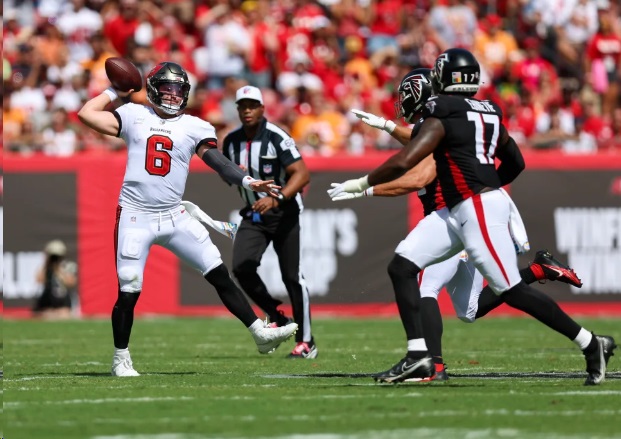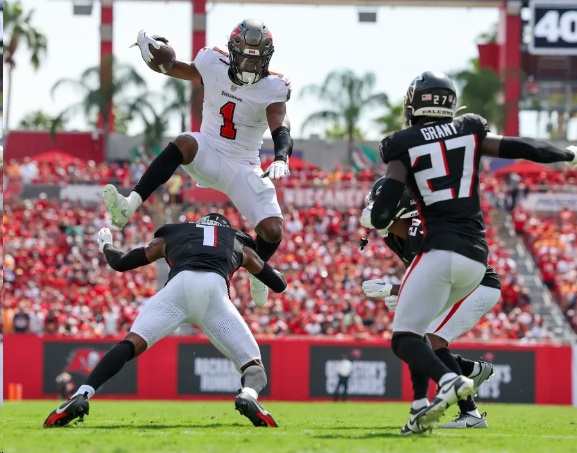|
|
 |
|
Is it too soon to admit that this Bucs offense looks hopeless?
| |
|---|
|
|---|
|
|---|
 Bless their hearts, the Bucs actually thought they had the game won. First down and 8 yards away from the end zone, they were certain they could score a touchdown in the final minute and slip out of Raymond James Stadium with a season-defining victory against the Falcons on Sunday afternoon. So, I guess you can add delusional to the list of maladies for Tampa Bay's offense.
Bless their hearts, the Bucs actually thought they had the game won. First down and 8 yards away from the end zone, they were certain they could score a touchdown in the final minute and slip out of Raymond James Stadium with a season-defining victory against the Falcons on Sunday afternoon. So, I guess you can add delusional to the list of maladies for Tampa Bay's offense.
As you know by now, the Bucs didn't come close to a touchdown. They settled for a game-tying field goal that, of course, turned out to be meaningless a few minutes later when the Falcons went 42 yards in 45 seconds and kicked a game-winning field goal of their own on the game's final play for a 16-13 victory.
Please, let this be the final case of confidence and optimism for an offense that deserves neither. The Bucs are off to their slowest start on the scoreboard in 10 years, and there is nothing fluky about it. This offense won't suddenly rebound, and it won't gradually grow into something remarkable.
The Bucs cannot score, they cannot run the ball, and they cannot blame Byron Leftwich any longer. They haven't yet forfeited the NFC South, but they have relinquished any sense of hope that a younger quarterback, a new coordinator and a revamped offensive line brought to training camp.
If you're counting - and darned if you don't have enough fingers and toes - the Bucs have scored 19 points the past two weeks. In four home games this season, they are 2-for-10 when it comes to scoring touchdowns in the red zone. Which is sort of like a PGA golfer whiffing at miniature golf. "I'm not exactly sure what needs to change," said receiver Chris Godwin. "We've just got to be better. We're not doing a good enough job scoring in the red zone."
Just to be clear, it's unfair to blame quarterback Baker Mayfield for Tampa Bay's shortcomings on offense. But, six games into the season, it's also unrealistic to think he can be the Bucs' savior. He may be tough and he might have some fine leadership qualities, but he's not a difference-maker. And if you have any doubts about that, you might want to check with fans in Cleveland. And Carolina. And Los Angeles.
 There is a reason he was available when the Bucs went shopping for a bargain quarterback in the offseason. Among the 15 passers with at least 2,000 attempts since 2018, Mayfield's interception rate is easily the highest in the NFL.
There is a reason he was available when the Bucs went shopping for a bargain quarterback in the offseason. Among the 15 passers with at least 2,000 attempts since 2018, Mayfield's interception rate is easily the highest in the NFL.
He may have more experience than his early days in Cleveland, but there is a certain hubris to his decision-making. He threw deep into double coverage in the first half and was fortunate that the pass was overthrown. And his interception in Atlanta territory with 3:41 remaining was the definition of inexcusable. Tight end Cade Otton was sandwiched between two defenders, and still Mayfield thought he could squeeze the pass in.
"It's a critical one that took points off the board, and that's completely on me," Mayfield said.
It's admirable that Mayfield has fallen on the sword two weeks in a row. Tom Brady rarely accepted personal blame, instead couching his self-criticism with a lot of double-talk. But self-flagellation doesn't do much good if you don't learn from your mistakes.
"It's tough when stuff is not going (right), but you can't curl up in a ball and cry about it," said left tackle Tristan Wirfs. "... We've got to keep going."
The Bucs are averaging 17.1 points per game, which is a step backward from last season. Even more ominous, they're averaging 10 points a game against the three teams they've played with winning records.
"We've just got to execute," Mayfield said. "When you're executing and winning, it kind of cures all. I think our defense did a great job."
That's part of the frustration. The Bucs have held opponents to 20 points or less in five of their six games, and yet their record is 3-3. That's not exactly a surprise. The thought process from head coach Todd Bowles from the start of the season was to avoid turnovers and play complementary ball on offense. If the Bucs could do that, they would have a narrow path to the postseason in a weak division.
Unfortunately, that formula only works if you can actually score more than one touchdown every two weeks.
John Romano, The Tampa Bay Times, published 23 October 2023
|

|
|
| |
| |
|